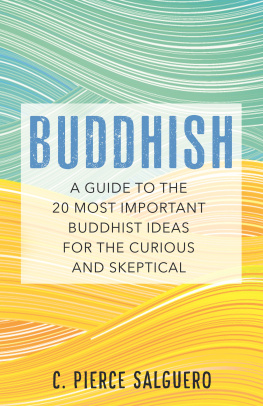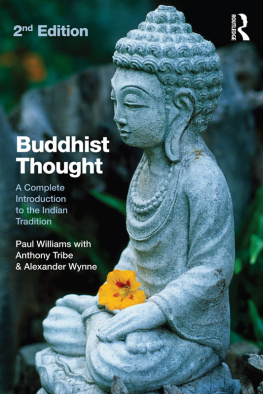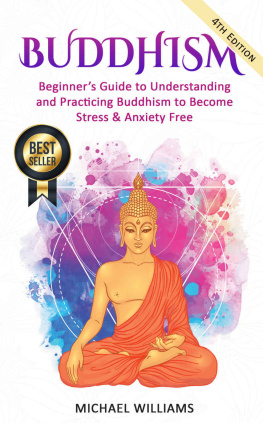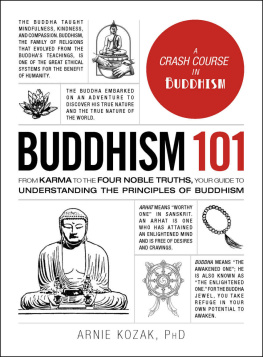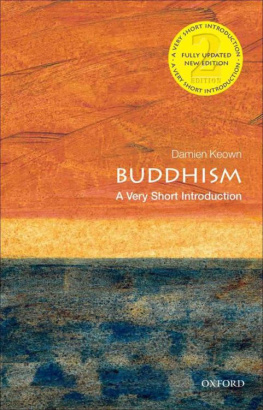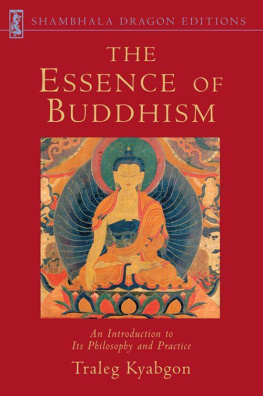Contents
Guide


NOTE ON BUDDHIST LANGUAGES
A general book on Buddhism is complicated by the fact that there are many languages to navigate. In this book, I have defaulted to Sanskrit when I am speaking in a general way about Buddhist terminology. If there is a culturally specific reference, however, I default to the language from that culture instead. In a few cases, Ive overridden these defaults and opted to use whatever term is most widely used in English-language literature instead. All of this is to facilitate the readers ongoing research and exploration of these concepts.
While it goes against my scholarly instincts, I have removed all diacritical marks from the foreign languages used here. In the interests of readability, I have also used standard phonetic transcriptions for Tibetan.
All translations throughout the book are my own unless otherwise attributed.
INTRODUCTION
A re you curious about Buddhism? Wondering what the hubbub is all about but roll your eyes every time you try to read a book about it? Well, if so, relax. This is not your ordinary introduction to Buddhism. This is not a book that teaches you how to practice meditation, and its not a self-help guide. There are none of the saccharine platitudes, high-minded moralizing, or dense pontification that you may have come to expect from a book on Buddhism. Nor is it a dry scholarly treatment of Buddhism filled with academic terminology and concepts. It is meant for open-minded or even skeptical readers who have no interest in professing faith in a new religion or adopting a new ideology.
This book presents a balanced introduction to twenty of the central principles of Buddhism, as I understand them and as I have experienced them. By the end of the book, you will have toured the Buddhist world and learned about how certain Buddhist ideas have been understood in China, Korea, Japan, Thailand, Tibet, and other cultures, including the West. You will know about some of the current trends in the academic study of Buddhism. You might even see how certain Buddhist ideas apply to your own situation and help to navigate challenges in your own life. What you wont get is indoctrination. I promise in these pages I will not try to convince you to practice Buddhism or to become Buddhist.
Who am I? Why should you trust me as your tour guide? Well, let me start by confessing that I am not Buddhist. I have no Asian heritage or family connections to Buddhism either. In fact, I come from a bilingual and transnational Latino family with roots in Colombia, Uruguay, Spain, England, and the United States. I spent my early childhood in Canada and Paraguay, and moved to the US during elementary school. Theres a lot of Catholicism and Protestantism in my family tree, as well as some native Amerindian blood; yet when I was growing up, we never talked about religion at all. To be honest, I dont even remember the first time I heard of Buddhism, but I imagine it must have been when I was in high school, when I started to become interested in several Asian spiritual traditions. Yet, somehow, Buddhism sparked my interest most of all, and it drew me in.
In the thirty years since that interest first took root, I have developed a long-term relationship with Buddhism by experiencing it and engaging with it in many different ways. I can honestly say I have come to have an enormous amount of interest, respect, and affection for this tradition, and it has been a constant companion throughout basically all of my adult life.
Here in this book, I will share with you my own personal perspective on Buddhism. I will weave in anecdotes from when I spent the summer in a monastery in a rural temple in the rainforest of eastern Thailand. I will bring in insights from the five years that I was a serious practitioner of vipassana meditation and the decade or so I have spent living in various parts of Asia (including not only Thailand but also India and Taiwan). I will also draw a lot on my fifteen years of experience studying Buddhism as an academic, during which time I have read extensively about its history and even learned to read medieval Chinese so that I could understand certain Buddhist texts in their original language. I will reflect on both the ways that Buddhist ideas and practices have helped me to navigate my own life and the ways that I have seen it help others.
Despite this extensive background, I repeat, I am not Buddhist. I am not a meditation teacher or a model practitioner. When asked to identify my religion, I like to joke that I might be Buddhish. I think Buddhism has had a lot to offer me, and I have cared about it for a long time, but I dont believe most of the stories, dont engage in most of the practices, and dont even agree with most of the philosophies. I have learned a lot from the tradition, but I have used my own judgment to evaluate what is useful and what is right for me. I have accepted some ideas and practices, but I have rejected many of the basic premises of the tradition. I am a student, friend, and fan of Buddhism but also a critic.
So, to be clear, what I am offering you here is a Buddhish book, not a Buddhist one. It is a Buddhish book. It is not a book written for Buddhists or for scholars of Buddhism. If you have an extensive background in Buddhism already, yet you insist on reading this book, then I assure you that you will find it objectionable. Youll say that its oversimplified, that its skewed, that its idiosyncratic, and that it doesnt do justice to your own particular understanding of or approach to Buddhism. So, if thats you, please look elsewhere. This book is intended for people who are complete newcomers, who dont already have a strong view about Buddhism one way or the other, and who are curious to learn what its all about in a lighthearted way without any doctrinal heavy lifting.
Why am I writing this book? Well, I think we need this kind of introduction to Buddhism. With mindfulness on the covers of magazines in the grocery store checkout lane and Dalai Lama memes all over the Internet, Buddhism is seemingly everywhere these days. Even so, its difficult to find a good introduction that speaks to ordinary people. Bookstore shelves are piled high with how-tos written by monks and meditators who preach the virtues of devoting your life to Buddhist practices. On the other end of the shelf, there are thick academic tomes that detail the history and doctrine in mind-numbing detail (some of which I myself have written!). This book is intended to fill a niche between these extremes. If you are curious about Buddhism and are looking for an accessible introduction in plain English, if you are open-minded to learning about what Buddhists think and say but dont necessarily want to be pressured to commit yourself to adopting these convictions yourself, then this is a book for you.
Before we start, I would like to ask for something from you. Even if you dont know very much at all about Buddhism, I am sure that you already have some preconceptions. Just by virtue of being a literate person alive in the twenty-first century, you have, I am pretty certain, already absorbed certain stereotypes about it. You probably associate Buddhism with peace, with mental health, with friendliness, and with harmony. When I say Buddhism, the first image that comes to mind is likely the smiling face of the Dalai Lama, a meditation teacher sitting on a cushion in lotus posture, or a golden Buddha statue from one Asian country or another. You may already have a feeling that Buddhism is a philosophy or a science of the mind or a lifestyle that attracts certain kinds of people. I am going to ask you to try to leave all of these preconceptions behind before you start reading. As I will demonstrate, a lot of these ideas are based on superficial or even wrongheaded notions of Buddhism. I am going to ask that you, as much as possible, try to start this book with a blank slate. In the words of the pioneering Zen teacher Shunryu Suzuki (19041971), do your best to bring a beginners mind to this endeavor. Please let these pages take you on a journey to an unfamiliar land, and allow yourself to be surprised and expanded by the new sights you find there.

